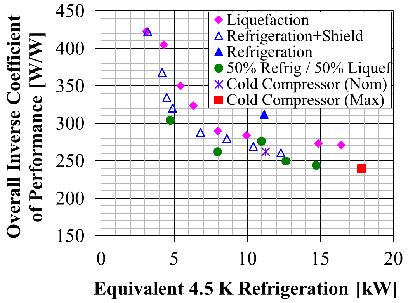
Joined the laboratory in August 2016
- MS, Mechanical Engineering, Thermal Sciences, University of Wisconsin at Madison, 1976
- PhD, Mechanical Engineering, Thermal Sciences, Oklahoma State University at Stillwater, 1979
- Accelerator engineering
Research
The development of practical and new cryogenic systems and components needed for the efficient and reliable operation of superconducting accelerators is my primary interest. These are complex, energy-intensive thermodynamic process systems, which require many well matched and efficient sub-systems. Their design requires a multi-disciplinary approach and iterative optimization process. The components used for these systems are often adopted from commercial refrigeration, or other such industries. Consequently, they may not be well-matched, and there is considerable opportunity to improve their efficiency and reliability. This requires a process-system and component level approach. Investigation requires thermodynamics, heat transfer, fluid mechanics, process control, and electrical power. The equipment involved includes fixed displacement compressors, turbomachinery, heat exchangers, adsorption beds, vacuum systems, and various types of instrumentation. My work has encompassed theory, research and development, and the implementation of these on systems used in industry and in government labs.

The figure shows the performance of large 4.5 kelvin helium cryogenic refrigerators over a wide capacity range and load type, which use the Ganni-Floating Pressure.
Biography
Four decades of experience in industry and at DOE accelerator laboratories, as well as building, commissioning, and operation of helium refrigeration systems for DOE laboratory particle accelerators, increased my curiosity for a deeper understanding of the thermodynamic principles in order to improve their efficiency, reliability, and operational flexibility. This all began with a curiosity to understand the theory behind the fundamentals for improving refrigeration systems efficiency to reduce the input power, reliability, and operational simplicity.
How students can contribute as part of my research team
Although we develop and investigate the theory governing what drives the efficient, reliable, and flexible operation of these systems, our goal is to develop actual hardware designs and test them in real applications. This is a unique opportunity available here in the cryogenics department at FRIB, providing students exposure to not only the theory and fundamental research, but also the design, fabrication, and testing of cryogenic systems.
Scientific publications
- Optimal design and operation of helium refrigeration systems using the Ganni Cycle, V. Ganni, P. Knudsen, Advances in Cryogenic Engineering 55, American Institute of Physics, New York (2010), 1057-107.
- FRIB helium refrigeration system commissioning and performance test results, P. Knudsen, V. Ganni et al., IOP Conf. Series: Materials Science and Engineering, 755 (2020), 012090.
- Cryogenic design of FRIB cryomodule and distribution system, V. Ganni, P. Knudsen et al., IOP Conf. Series: Materials Science and Engineering 755 (2020) 012091.

